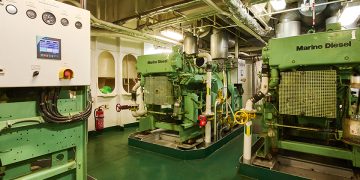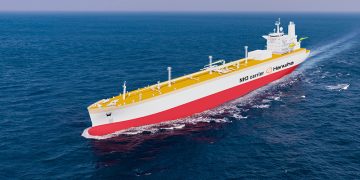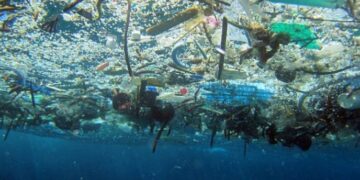In an exclusive interview to SAFETY4SEA, Dom McKnight Hardy, Managing Director at MIS Marine, talks about the opportunities that big data, Artificial Intelligence, Machine Learning and the other emerging technologies bring to front, highlighting that collaboration is crucial to achieving success.
Considering that digitalisation is revolutionising business processes, the industry must take advantage to improve its safety, security, health and environmental performance. In that regard, he explains how Marine Assurance can move beyond the fundamentals of safety and pollution by leveraging the latest technologies.
SAFETY4SEA: What are the top priorities in your agenda for the next five years?
The nature of risk assessment has changed, and our top priority over the next five years is to widen our engagement and increase our industry collaborations globally so that our partners can harness the power of the new technologies and new mindsets that are emerging.
Big Data and Artificial Intelligence (AI) have opened a new realm of opportunity to learn from the vast datasets now available to Marine Assurance. The potential is so great that we consider this a new era: Marine Assurance 2.0, and through it, Marine Assurance can now move beyond the fundamentals of safety and pollution prevention. By leveraging data sources and the latest technologies to deepen insight into sanctions, emissions, labour and vessel performance, Marine Assurance 2.0 can drive policy, monitor compliance, and streamline efficiency.
The risks that our industry faces are evolving at an unprecedented pace, so these are not static objectives which are easily met. However, Marine Assurance 2.0 powers intelligent decision-making and creates a feedback loop into newly informed assurance policies – creating a continuous improvement cycle. At MIS Marine, we are continuously advancing our capabilities to lead this improvement cycle and futureproof assurance for our partners and the industry as a whole.
S4S: From your perspective, what are the industry’s current challenges and how could your organisation assist towards alleviating these pressures?
Now more than any time in recent history, businesses globally are having to think more about the wider context of cargo movements. Sanctions compliance, for example, is a difficult puzzle to solve. More than 2,600 sanctions have been introduced since the Russian invasion of Ukraine earlier this year, and ever-increasing sanctions can instantly jeopardise a previously fully informed decision.
Environmental compliance is another big challenge. Not meeting decarbonisation and emissions targets will surely carry financial and reputational penalties, with major regulatory changes, such as the introduction of Energy Efficiency Existing Ship Index (EEXI) and Carbon Intensity Indicator (CII) just around the corner.
The challenges are not insurmountable, but in this climate, risk can no longer be evaluated solely by a physical inspection alone or a simple review of a ship’s characteristics. It is critical to empower ship owners, operators, charterers and energy companies by providing combined intelligence from multiple high-level data sources and detailed analyses to support their decision-making.
This is where Marine Assurance comes to the forefront – where it goes beyond just vetting systems and includes innovative compliance functions. Advanced Marine Assurance solutions must now undergo constant development, have updates automatically applied, and allow stakeholders to remain system confident.
S4S: How can Marine Assurance and your systems help to reduce incidents/accidents at sea?
Marine Assurance is supporting active risk management and the maintenance of a sound safety culture onboard by helping to guide the industry towards new safety standards. This involves assessing risk exposures, and sometimes identifying and pushing the implementation of safer conditions.
The introduction of SIRE 2.0 will supply more information that can support the industry in this endeavour. The new human factor element will provide previously unavailable forms of data that highlight trends identifying areas of weakness, areas of exposure and critical conditions that could compromise safety. However, in order to access this higher level of intelligence, vetting systems need to advance.
S4S: What do you think will be the biggest challenges for both shipping companies and seafarers onboard when the SIRE 2.0 becomes operational?
Managing the new volumes of data will potentially be a challenge for many, as the SIRE 2.0 inspection regime will significantly expand the scale, depth and quality of data gathered for Marine Assurance purposes during vessel inspections. This is a huge positive, however, as it fully enables the advantages of digitalisation, including significantly improving data quality, adding layers of detail not available before to enable a more granular and specific focus on processes, equipment, and people.
S4S: How can data sharing and digital technologies be leveraged to improve the maritime community to ensure compliance and minimize risks?
Algorithms and machine learning enable us to determine trends and patterns, identifying immediate and root causes of issues across an inspection, a vessel and a fleet.
Given the current pace and scale of change, the combination of human and AI are enabling crucial and timely decisions to be made with confidence. AI will start to become a necessity to enable information to predict the likelihood of future incidents. However, AI will always require interpretation from experts that know maritime and all its complexities and nuances.
S4S: How can we further support crews and how can technology assist to that end?
There is no one-size-fits-all when it comes to digitising the shipping industry, and the level of digitisation varies hugely across the industry. However, those who have made the leap to embrace digitalisation have already enjoyed business-wide benefits.
It can be challenging to manage the change and create a successful digital culture where companies truly reap the benefits of digitalisation. It is as much about people as it is about technology, and we see collaboration as being crucial to achieving success.
S4S: In your view, has the industry been successful in enhancing its safety performance? What should be the next steps?
While the shipping industry continues a decades’ long improvement in the safety of its assets, the nature and magnitude of the risks it faces do not stand still. Today, digitalisation is revolutionising business processes, voyage planning, as well as the automation, remote monitoring and performance of machinery onboard ships. The marine industry is now experiencing a shift in responsibilities as it adapts to new regulations and operating methods. As these interacting forces evolve, Marine Assurance systems must also evolve, leading the way forward.
S4S: From your perspective, if you could change one thing across the industry, what this would be and why?
We are passionate about the need to champion the importance of Marine Assurance within the shipping and energy sectors, and to educate these industries on the crucial role that it plays. Marine Assurance underpins maritime safety, regulatory compliance and sustainability by defining the vetting and inspection regime that assesses the risks relating to a vessel’s operations, and on compliance. Therefore, Marine Assurance is a business-critical discipline, and we would like to see that recognised more widely. At present, it is the unsung hero of marine safety and environmental performance. We want to bring it into the spotlight and widen collaboration so that more data can be standardised and shared to benefit the industry.
S4S: Do you have any developments/ projects / plans that you would like to share with the rest of the industry?
MIS Marine has invested heavily in the development of advanced Marine Assurance solutions. We have recently launched our Mainstay Core product to make Marine Assurance technology more accessible for customers of all sizes. It is an entry-level product, and in addition to providing consolidated vetting data that enables faster and more efficient decision-making, Mainstay Core provides a comprehensive snapshot view of sanction data to support compliance for ship charterers, and minimise the risks for ports and terminals.
Through standardised but configurable risk policies, Mainstay Core provides full access to Marine Assurance data sources, enabling effective and simple screening processes and streamlined third party communication. With an intuitive Review screen, one-click decision making and colour coded document status indicators, vetting operations are streamlined and time efficient – helping charterers, ports and terminals to make the right decision, faster.
Providing a complete data view, responsive compliance tracking and ultimately streamlining vetting operations, Mainstay Core underpins vetting processes for tankers, barges and offshore vessels and their related companies, providing berth-to-berth assurance of an entire journey, contract, or project.
S4S: What is your key message to industry stakeholders with regards to risk assessment and risk management?
The industry must take advantage of digitalisation to help shipping continuously improve safety, security, health and environmental performance. We believe that collaboration is key to meeting the challenges and achieving our common goals.
The views presented hereabove are only those of the author and not necessarily reflect those of SAFETY4SEA and are for information sharing and discussion purposes only.






























































